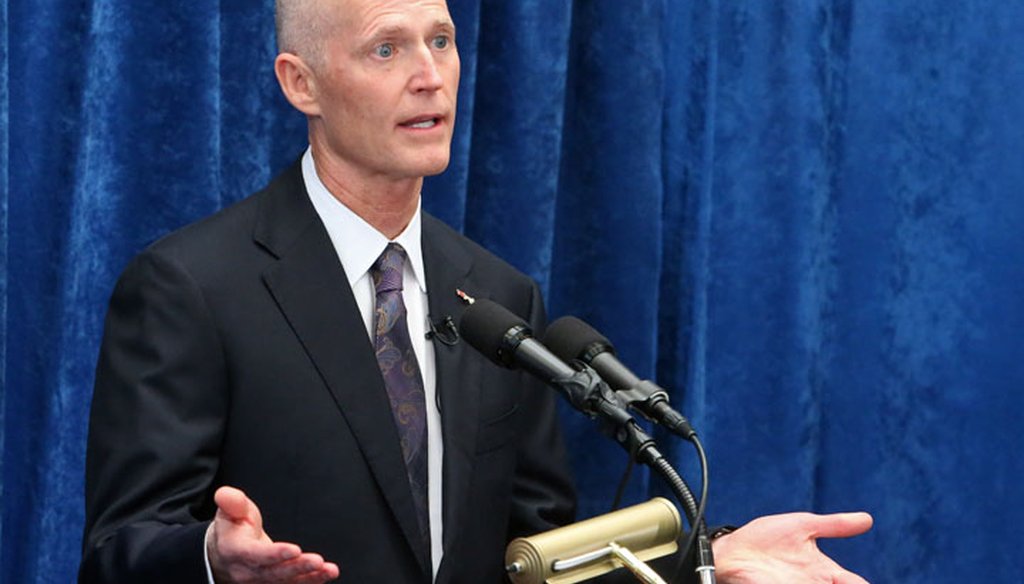Stand up for the facts!
Our only agenda is to publish the truth so you can be an informed participant in democracy.
We need your help.
I would like to contribute

Gov. Rick Scott will give his State of the State address on Jan. 12, 2016. (AP photo)
Gov. Rick Scott’s State of the State address Tuesday kicks off a legislative session that will put several of his campaign promises to the test.
It’s a safe bet his speech will highlight two of his favorite issues — taxes and jobs. Scott has asked the Legislature for $1 billion in tax cuts, a goal some lawmakers have already said is impossible to meet.
PolitiFact Florida’s Scott-O-Meter is tracking 57 of Scott’s campaign promises. Some of those — especially the promises about taxes — will come into play during the session.
Scott argues the tax cuts are necessary to grow the state’s economy and help Florida’s families. His proposed budget suggests extending a sales tax exemption on college textbooks (saving taxpayers $46 million) and providing two, multi-day sales tax holidays for disaster preparedness and school supplies (costing the state about $73 million).
Scott has boasted of cutting taxes more than 40 times since he took office, but the bulk of this year’s requested tax cuts are earmarked to help businesses and corporations. That hasn’t been such an easy sell, even to a Republican-led Legislature, which has stymied his progress on several pro-business campaign promises.
Three tax promises
One promise is to permanently eliminate a sales tax on manufacturing equipment. The Legislature previously suspended the tax through April 30, 2017, but Scott still wants the tax repealed entirely, giving businesses about $77 million in annual tax breaks. He and other lawmakers have been pushing for a couple of years to get rid of the tax for good, but there’s been no movement. So we’ve rated this promise In The Works.
Scott has also promised to phase out the state’s 6 percent sales tax on commercial leases. Florida is the only state to levy such a tax. Scott has proposed dropping it to 5 percent for the 2017 calendar year, a suggestion echoed by bills HB 247 in the House and SB 116 in the Senate. That change would save businesses $339 million over two fiscal years, according to Scott’s office.
Rep. Larry Ahern, R-Seminole, also has filed a bill (HB 219) to repeal the tax entirely by 2025. While we’re waiting to see what happens, we’ve rated Scott’s promise In The Works.
The biggest change in Scott’s budget proposal addresses his promise to eliminate the state’s 5.5 percent corporate income tax, which brings in about $2 billion in revenue each year.
With legislators unwilling to do away with the tax, Scott asked for steadily increasing exemptions. Lawmakers gave businesses a $50,000 exemption during Scott’s first term, but they have since balked at giving corporations any more breaks for fear of losing too much tax revenue.
Scott this year proposed dropping the tax entirely for manufacturing and retail businesses, costing the state $770 million per year. Bills in the House and Senate, HB 219 and SB 76, would instead raise the exemption to $75,000. But some lawmakers have signaled they don’t favor losing even that much from state coffers, so we continue to rate this promise Stalled.
Beyond the balance sheet
But there’s more to Scott’s promises than just taxes. We’ll also be watching how his promises play out this session on the economy, education and the environment.
Scott’s signature 7-7-7 campaign pledge from 2010 was to create 700,000 jobs using seven steps over seven years. Scott will likely use his speech to claim the state has added more than 1 million jobs through November 2015, but there’s more to the numbers than that.
As the Scott-O-Meter sees it, Scott must actually reach 1.7 million jobs, because he originally promised the growth would come on top of the million jobs Florida would create as it climbed out of the recession.
Also, Scott only considers private sector job growth. When we factor in government job losses, the most recent figure is 984,500 net new jobs in five years. We rated his pledge In The Works.
Attracting more jobs from out of state has been a key part of Scott’s strategy. This year, he’s asked the Legislature for $250 million for a new recruiting fund through Enterprise Florida. However, he hasn’t asked for an increase to an existing export assistance program for existing businesses. He had promised to double the export program’s funding to $2 million in 2014, but his most recent budget request would keep funding the same. We’ve rated it Stalled.
Before the 2015 session, Scott vowed to reduce the number of standardized tests in Florida schools, which led to an 11th-grade language arts test being ended after a state review. But another goal — raising per-pupil spending for K-12 education — has so far eluded Scott.
The highest dollar amount per student was $7,126 in 2007-2008 under former Gov. Charlie Crist. Scott, who oversaw a major cut to education spending during his first term, last year pushed for an increase but came up short. This year he wants the Legislature to spend $7,176 per pupil for an education budget likely to top $20 billion.
But even if Scott succeeds, the dollar amount lags far behind Crist’s per-pupil spending when adjusted for inflation. It’s up to legislators to make the next move, so we rated this promise In The Works.
Scott has avoided giving an opinion on last session’s Amendment 1 land acquisition fund battle, though he did make a re-election promise to enact tougher penalties for violating environmental regulations. Fines for breaking these rules have dropped overall during Scott’s term.
This session, HB 191 and SB 318 would take away the power of local governments to ban fracking and put the power in the hands of the state, making the controversial practice easier for oil and gas companies. Environmentalists and local governments oppose the legislation, but the bills do increase fines from $10,000 to $25,000 for violations such as not following DEP rules, improper storage of gas or refusing to allow a state inspection.
For now, we’ve rated this promise Stalled.
PolitiFact Florida will be tracking the 2016 legislative session. Send ideas for fact-checks to [email protected].
Our Sources
See individual promises for complete source lists.




























